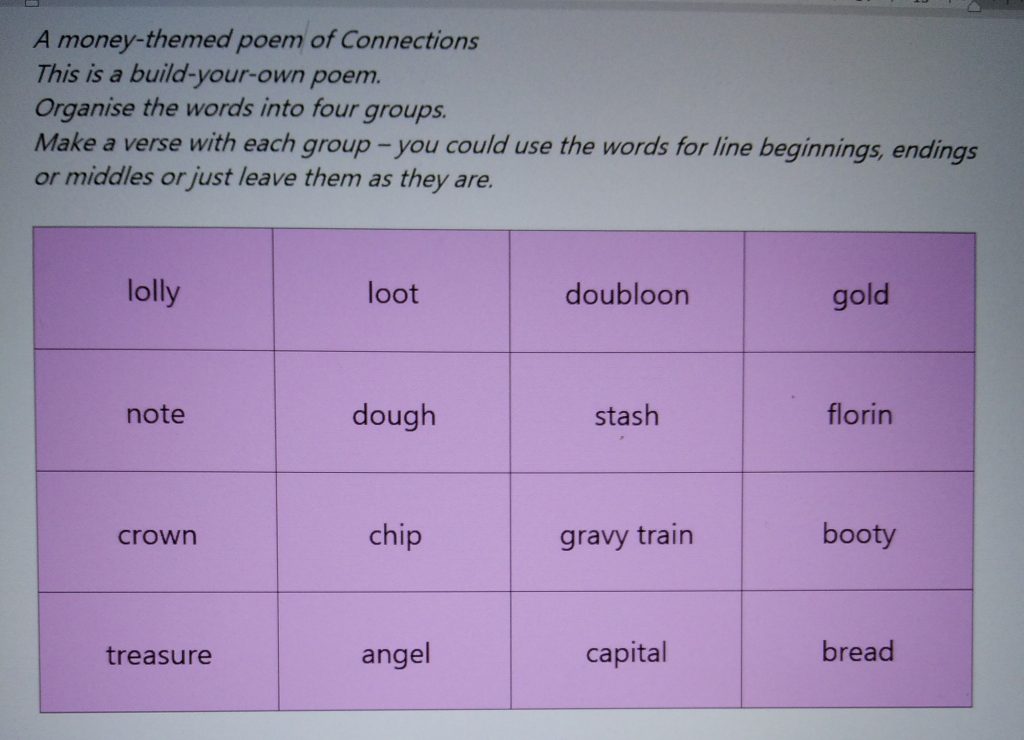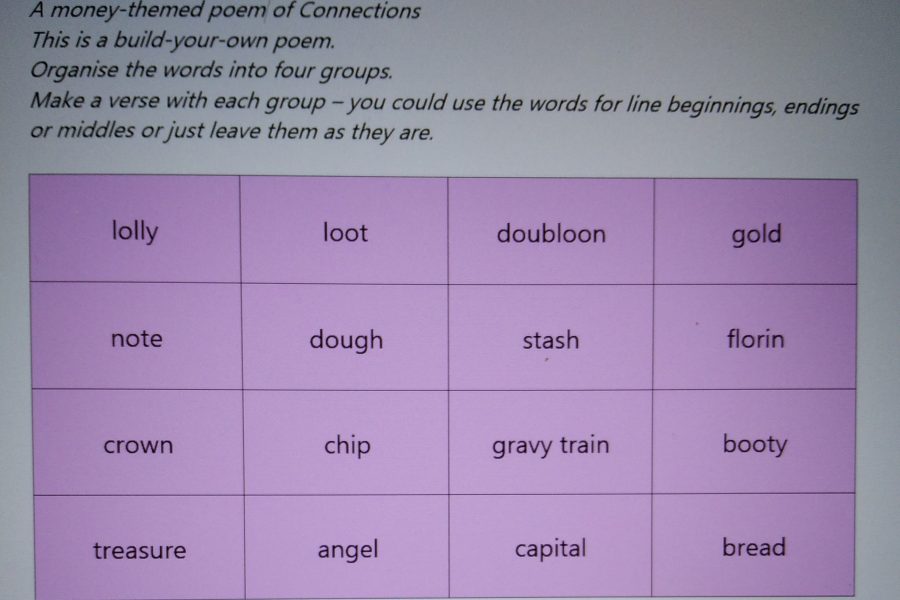April was NaPoWriMo. National Poetry Writing Month. Intrepid poets commit to writing (or at least drafting) a poem each day of the month. Since most of us spend a lot of energy complaining that we don’t have enough time to be creative, this is a wonderful opportunity to give ourselves permission to be creative every single day. It’s also a tough challenge – ir turns out that creativity doesn’t just turn up every time you sit down and invite it to. So, as with everything in life, poets have devised hacks to help.
The most common is to use prompts. Organisations like the Poetry Society send out prompts on social media every day; maybe a theme, or a technique, or a style of poetry. Some are intricate and detailed. One this month was to write a sestina, a fiendishly technical poetic form. I know, I did it once and it took me about a fortnight – though it was thoroughly worth it as my sestina won third prize in a competition! Others are fun. The other day it was to think of two very different objects and write a poetic argument between them.
But the best hack, for me, is to do it in a group. I did it last year on WhatsApp with a group of children’s poets and we’re doing it again this year, with some battle-hard repeaters and some rookies. We post our poems for each other to comment on, so it’s even more work, because you have to read other people’s poems and respond to them, as well as writing your own. But it is also brilliant. We are relentlessly supportive of each other’s work, which on the thin days is really handy. It’s also easy to be positive, as everyone else’s stuff is really impressive. Everyone is doing something different and seeing such a variety of approaches, often to the same topic if they’ve used the same prompt, is extremely helpful. You find that, as the month goes on, your creative synapses are firing better, you can do things you didn’t know you could and that a hive mind really is a thing. You learn from each other, you grow, you develop.
Last year I set myself the challenge of writing about climate for children. It’s something I’ve been trying to do for a long time, and I wanted to write accessible, fun poems that go further than simply admiring nature, without succumbing to the panic or despair that the subject can fall into. What I learned and produced during that month enabled me to build a collection of poems on the theme which is coming out next year – my first full-length publication. Wow!
I thought it would be hard to top that this year, but I knew I didn’t want to follow any of the NaPoWriMo prompts, because I knew I wanted to try to handle a single theme throughout the month, to give myself some continuity and allow myself to develop ideas through the month rather than butterflying from one thing to the next. But I didn’t know what.
In desperation, on March 31st, I picked a book out of my random presents box and decided to go with it. It’s a book for children called Money for Beginners and when I saw it in the bookshop I thought it would be funny to give it to one of my grownup sons as a Christmas present. But I didn’t because I thought it also would be unfair, since money perplexes me at least as much as it does them. The moment had come to lean into that bewilderment.
I had a feeling this would be interesting – I have found that writing, and especially writing poetry, is a really good way for me to engage with things that are bugging me (like the climate!). I don’t find pat solutions, but I do find in poetry a safe space to explore, to wrestle and to be honest about difficulty. So this seemed like a good fit. However, thirty poems for children about money – that would surely be a stretch.
It was, but I did it, and there’s more to come: there are still pages and pages of prompts left in my book. Many – most – of the poems are drafts but there’s a surprising variety of topics, styles and approaches in what seems to be becoming a body of work. It was hair-tearingly challenging at times, but it was also loads of fun. And my stonkingly brilliant WhatsApp children’s poetry friends kept me going, holding my feet very kindly to the fire and feeding my creative juices. It’s a trope that writing is a solitary pursuit but so many of us gain immensely from working together, alongside each other, that I don’t think that’s really true. Writing is the opposite of solitary, it’s connection. If you don’t have a writing group and you’re reading this I cannot recommend highly enough finding one. You’ll (almost certainly) be amazed at what you get out of it.
One more thing that’s been encouraging is that I can see how far I’ve come since last year. I understand my process better, I have more tools and resources and I’ve ended up with a higher proportion of drafts that are worth working on than last year. These are good things to know.
Only one day came close to total disaster. I was away from home and I’d brought my notebook but forgotten Money for Beginners! No prompt! So I improvised. This, too, is a draft I hope to improve on, but it’s a type of poem that I would definitely include in a children’s collection because it gives the readers the opportunity to get active themselves. It’s based on the Connections game you see on the internet and on BBC2, if you accidentally flick onto the fiendsh quiz Only Connect (surely no one has the courage to watch it on purpose…) and it’s a build-your-own poem. If you, dear reader, decide to have a go, do let me see your results!

